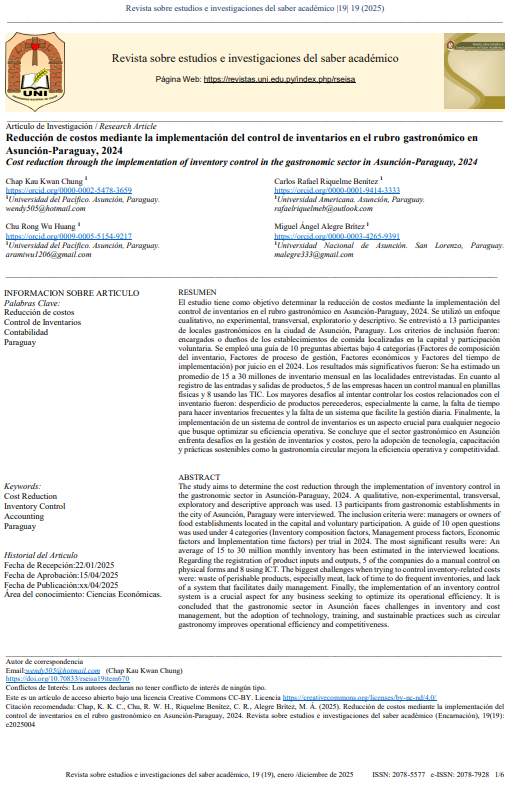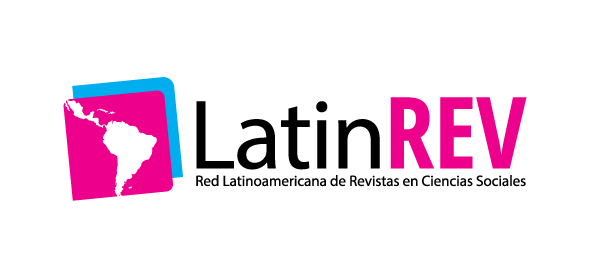Cost reduction through the implementation of inventory control in the gastronomic sector in Asunción-Paraguay, 2024
DOI:
https://doi.org/10.70833/rseisa19item670Keywords:
cost reduction, inventory control, accounting, ParaguayAbstract
The study aims to determine the cost reduction through the implementation of inventory control in the gastronomic sector in Asunción-Paraguay, 2024. A qualitative, non-experimental, transversal, exploratory and descriptive approach was used. 13 participants from gastronomic establishments in the city of Asunción, Paraguay were interviewed. The inclusion criteria were: managers or owners of food establishments located in the capital and voluntary participation. A guide of 10 open questions was used under 4 categories (Inventory composition factors, Management process factors, Economic factors and Implementation time factors) per trial in 2024. The most significant results were: An average of 15 to 30 million monthly inventory has been estimated in the interviewed locations. Regarding the registration of product inputs and outputs, 5 of the companies do a manual control on physical forms and 8 using ICT. The biggest challenges when trying to control inventory-related costs were: waste of perishable products, especially meat, lack of time to do frequent inventories, and lack of a system that facilitates daily management. Finally, the implementation of an inventory control system is a crucial aspect for any business seeking to optimize its operational efficiency. It is concluded that the gastronomic sector in Asunción faces challenges in inventory and cost management, but the adoption of technology, training, and sustainable practices such as circular gastronomy improves operational efficiency and competitiveness.
Downloads
References
Bazán Benítez, S., Morel Giménez, Á. S., Solís Cañete, S. R., Méndez, I. G., Sánchez Noguera, G. A., & Kwan Chung, C. K. (2021). Impacto de la pandemia de la COVID-19 en el sector gastronómico del Paraguay durante marzo y abril 2020. Revista de Análisis y Difusión de Perspectivas Educativas y Empresariales, 1(1), 55-61. https://doi.org/10.56216/radee012021jun.a05
Castro-Pacheco, J. A., & Zaldumbide-Peralvo, D. A. (2022). Proceso de digitalización comercial y su relación con las ventas de los negocios gastronómicos. Estudio de caso en el contexto local en el periodo 2020-2021. 593 Digital Publisher CEIT, 7(4-1), 499-509. https://doi.org/10.33386/593dp.2022.4-1.1253
Cortés, Á. M., Blanco Garrido, F., Abuchar Porras, A., Simanca, F. A., & Carreño Hernández, P. (2020). Modelo de costos ocultos en el sector gastronómico con base en NTC ISO 9001:2015. Aglala, 11(2), 249-267. http://revistas.curnvirtual.edu.co/index.php/aglala/article/download/1750/1182
Eslava Zapata, R., Parra González, B., & Chacón Guerrero, E. J. (2023). Gestión de costos de restaurantes: estudio empírico en Cúcuta – Colombia. FACE Revista de la Facultad de Ciencias Económicas y Empresariales, 22(3). https://doi.org/10.24054/face.v22i3.1457
Eslava-Zapata, R., Chacón-Guerrero, E., & Parra-González, B. (2022). Relación entre los niveles de conocimiento y gestión de los costos de producción de los gerentes del sector gastronómico colombiano. Revista de Investigación Desarrollo e Innovación, 12(1), 35-44. https://doi.org/10.19053/20278306.v12.n1.2022.14204
Esteche, E., Venialgo Figueredo, M., López Paredes, H. A., & Gamboa Ortiz, J. D. (2023). Innovación de microempresas en entornos difíciles. Caso: sector gastronómico de Itapúa – Paraguay. Podium, 43, 41-56. https://doi.org/10.31095/podium.2023.43.03
González, A. (2020). Un modelo de gestión de inventarios basado en estrategia competitiva. Ingeniare. Revista Chilena de IngenieríA, 28(1), 133-142. https://doi.org/10.4067/s0718-33052020000100133
Mendoza Acevedo, M., & López Ojeda, A. (2024). Alcances e importancia de la cadena de valor como herramienta de diagnóstico y análisis para micro y pequeños negocios gastronómicos. Región y Sociedad, 36, e1845. https://doi.org/10.22198/rys2024/36/1845
Menéndez-Mera, M., & Aguayo-Joza, J. (2023). Prácticas Contables y su Incidencia en la Toma De Decisiones En Emprendedores Gastronómicos de Portoviejo, 2020. 593 Digital Publisher CEIT, 8(4), 512-529. https://doi.org/10.33386/593dp.2023.4.1931
Montes Uribe, J. J. (2024). Big data e inteligencia de negocios aplicado en el sector gastronómico. Infometric@ - Serie Ingeniería, Básicas y Agrícolas, 7(1). http://www.infometrica.org/index.php/syh/article/view/209
Sossa Álvarez, R. D., Rivero Pinto, M. A., & Camacho Estrada, S. N. (2024). La planificación y la gestión sostenible del turismo gastronómico en Santa Marta, Colombia. Explorador Digital, 8(3), 180-200. https://doi.org/10.33262/exploradordigital.v8i3.3160
Taramona Ruiz, L. A., Sánchez Vargas, H. E., García Chumioque, F. G., Salgado Rodríguez, A., Huatuco Lozano, M. M., & Sánchez Batista, A. (2023). La investigación de operaciones. Estudio para su aplicación en establecimientos gastronómicos y turísticos en Lima. Retos de la Dirección, 17(2). http://scielo.sld.cu/scielo.php?pid=S2306-91552023000200007&script=sci_arttext
Trujillo, J. A. (2020). Sistema para el control de inventarios en la empresa “Inversiones Novillo de Oro S.A.S. Revista de Ingeniería Matemáticas y Ciencias de la Información, 7(14), 105-116. https://doi.org/10.21017/rimci.2020.v7.n14.a87

Published
How to Cite
License
Copyright (c) 2025 Chap Kau Kwan Chung, Chu Rong Wu Huang, Carlos Rafael Riquelme Benítez , Miguel Ángel Alegre Brítez

This work is licensed under a Creative Commons Attribution 4.0 International License.
Creative Commons Attribution License CC-BY
You are free to:
Share — copy and redistribute the material in any medium or format.
Adapt — remix, transform, and build upon the material for any purpose, including commercially.
Under the following terms:
Attribution — You must give appropriate credit, provide a link to the license, and indicate if any changes have been made. You may do so in any reasonable way, but not in any way that suggests that you or your use is endorsed by the Licensor.






